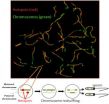(Press-News.org) The HFES George Mason University (GMU) Student Chapter was recently featured in a television news story about an interactive driving simulation video game the students developed to highlight the human factors/ergonomics science behind distracted driving. The demonstration made its first appearance at the October 2010 USA Science and Engineering Festival in Washington, DC, where the GMU students partnered with the Federation of Associations in Behavioral & Brain Sciences (FABBS). Nearly half a million visitors attended the two-day festival, and the distracted driving display was a popular attraction.
Festival goers—mostly children of various ages—sat behind the simulator "wheel," and were handed a cell phone and asked to send a simple text message to their parents. Almost immediately, the children veered from the lane, and most of them crashed into the side wall. GMU student Haneen Saqer explained to stunned simulator drivers why they did so badly. "We have a difficult time dividing our attention between two tasks, and when we do so, our performance on one of the tasks suffers. The brain has limited resources, and because driving is a demanding task, we should allocate our undivided attention to it."
Michael Perel, former National Highway Traffic Safety Administration Human Factors Division chief, was so impressed with the display that he introduced the idea to traffic safety officers at the Fairfax County Police Department. In February, Perel, GMU Student Chapter members, and the traffic officers brought the presentation to the Department of Motor Vehicles education class at Westfield High School in McLean, Virginia.
The driving simulator–based video game had some of the high school students vowing to stop texting behind the wheel. "Now I know it can wait, and it's not worth it," said 16-year-old Katie Manning. "So I'm going to try my best to never text behind the wheel." The session was covered by the local ABC affiliate and can be viewed at http://www.fabbs.org/news/news-archive/abc-news-highlights-human-factors-research/.
Since the initial demonstration at Westfield, two other schools have expressed interest in bringing the driving simulator to their students. The GMU students continue to work with the Fairfax County Police Department to explore expansion of the program to other high schools in their jurisdiction.
The festival provided a unique opportunity for GMU faculty and students to interact with children while educating them about HF/E principles and making science exciting and relatable to them. "It was incredible to see the immediate and profound impact that the simulation had on parents and children at the festival," said GMU student and HFES member Nicole Werner. "Pairing that with the ability to explain the scientific reasons for what was happening in real time was a rewarding experience for me and all of the volunteers."
Haneen added to that sentiment. "The demonstration on the Mall allowed us to share our passion for human factors/ergonomics research, highlight the experimental and cognitive principles involved, while at the same time teaching them the dangers of distracted driving."
###
For more details, pictures, and video of the festival, please visit http://www.fabbs.org/fabbs-foundation/foundation-events/usa-science-and-engineering-festival/. Information about the George Mason University human factors and applied cognition graduate program can be found at http://archlab.gmu.edu/.
The Human Factors and Ergonomics Society is the world's largest nonprofit individual-member, multidisciplinary scientific association for human factors/ergonomics professionals, with more than 4,300 members globally. HFES members include psychologists and other scientists, designers, and engineers, all of whom have a common interest in designing systems and equipment to be safe and effective for the people who operate and maintain them. Watch science news stories (http://www.aip.org/dbis/HFES/) about other HF/E topics at the HFES Web site. "Human Factors and Ergonomics: People-Friendly Design Through Science and Engineering"
George Mason students highlight dangers of distracted driving
The students' driving simulator video game stuns children and adults alike by demonstrating how badly they drive while texting
2011-04-06
ELSE PRESS RELEASES FROM THIS DATE:
tokyo rag Launches Inaugural Boutique Collection of Handmade Luxury Fashion Accessories
2011-04-06
tokyo rag, a handcrafter of high end fashion accessories, unveils a new 'Tokyo-inspired' collection for this summer. Covering a wide product range in distinctive and vibrant designs, tokyo rag targets women and men with rock star attitude, who are fresh in mind, never tired to explore and interested in couture and style. No snobbishness, just high quality accessories with a creative twist. Each piece is handcrafted using luxury fabrics and ecological tanned top quality leathers from carefully selected European tanneries.
The fashion accessories are available in four ...
MU researcher says instructors can reduce cheating by being clear
2011-04-06
A new University of Missouri study says that the reasons students give for cheating are rational, and that stricter punishments won't solve the problem. Instead, teachers should communicate clear standards and provide consistent enforcement to reduce instances of cheating.
Edward Brent, associate chair of the Department of Sociology in the MU College of Arts and Science, and Curtis Atkisson, an MU anthropology student, asked students, "What circumstances, if any, could make cheating justified?"
While a majority of the students said that no circumstances can ever justify ...
Elevated levels of sodium blunt response to stress, study shows
2011-04-06
CINCINNATI—All those salty snacks available at the local tavern might be doing more than increasing your thirst: They could also play a role in suppressing social anxiety.
New research from the University of Cincinnati (UC) shows that elevated levels of sodium blunt the body's natural responses to stress by inhibiting stress hormones that would otherwise be activated in stressful situations. These hormones are located along the hypothalamic-pituitary-adrenal (HPA) axis, which controls reactions to stress.
The research is reported in the April 6, 2011, issue of The Journal ...
NIH, USU study maps hotspots of genetic rearrangement
2011-04-06
Researchers have zoomed in on mouse chromosomes to map hotspots of genetic recombination — sites where DNA breaks and reforms to shuffle genes. The findings of the scientists at the National Institutes of Health and Uniformed Services University of Health Sciences (USU) have the potential to improve the detection of genes linked to disease and to help understand the root causes of genetic abnormalities. The research, published online April 3 in Nature, moves scientists one step closer to understanding how mammals evolve and respond to their environments.
In this image, ...
Analysis of opioid prescription practices finds areas of concern
2011-04-06
An analysis of national prescribing patterns shows that more than half of patients who received an opioid prescription in 2009 had filled another opioid prescription within the previous 30 days. This report also suggested potential opportunities for intervention aimed at reducing abuse of prescription opioids.
Researchers from the National Institute on Drug Abuse (NIDA), a component of the National Institutes of Health, will publish results of this analysis in this week's Journal of the American Medical Association (JAMA).
"More research is needed to see if current ...
Frozen comet had a watery past, University of Arizona scientists find
2011-04-06
For the first time, scientists have found convincing evidence for the presence of liquid water in a comet, shattering the current paradigm that comets never get warm enough to melt the ice that makes up the bulk of their material.
"Current thinking suggests that it is impossible to form liquid water inside of a comet," said Dante Lauretta, an associate professor of cosmochemistry and planet formation at the UA's Lunar and Planetary Laboratory. Lauretta is the principal investigator of the UA team involved in analysis of samples returned by NASA's Stardust mission.
UA ...
Using MRI, researchers may predict which adults will develop Alzheimer's
2011-04-06
OAK BROOK, Ill. – Using MRI, researchers may be able to predict which adults with mild cognitive impairment are more likely to progress to Alzheimer's disease, according to the results of a study published online and in the June issue of Radiology.
Mild cognitive impairment (MCI) is an intermediate stage between the decline in mental abilities that occurs in normal aging and the more pronounced deterioration associated with dementia, a group of brain disorders that includes Alzheimer's disease (AD).
Individuals with MCI develop AD at a rate of 15 to 20 percent per ...
Marbella University Unveils an MBA Program to "Save Humanity and the Planet"
2011-04-06
Lies, cheat, deceit, distortion, hype, and a blind pursuit of profit have poisoned the business world. The price of this has been the destruction of the planet, its ecosystems and the alienation of humans from their soul and genuine inner needs.
Pollution, contamination, climate change, poverty, rising sea level, unemployment, financial crisis, social unrest, war, and a general lack of trust has taken over as a result.
The world needs new managers and CEOs; new MBAs
The state of humanity and the planet clearly shows: politics has failed, corporations have failed, ...
Study: Socioeconomics playing reduced role in autism diagnoses
2011-04-06
WASHINGTON, DC, April 4, 2011 — While there is an increasing equality in terms of the likelihood that children from communities and families across the socioeconomic spectrum will be diagnosed with autism, a new study finds that such factors still influence the chance of an autism diagnosis, though to a much lesser extent than they did at the height of rising prevalence.
"As knowledge has spread about autism, information is now more evenly distributed across different kinds of communities," said Peter S. Bearman, the Cole Professor of the Social Sciences at Columbia ...
New survey: 72 percent of Americans think health-care system needs major overhaul
2011-04-06
New York, NY, April 6, 2011—Seven of 10 adults think the U.S. health care system needs to be fundamentally changed or completely rebuilt, according to a Commonwealth Fund survey released today. The concerns reflect widespread experiences with access barriers, poorly coordinated care and growing costs. The survey also reveals strong support for more patient-centered care systems and innovative use of teams and information systems.
The new survey found that a large majority of U.S. adults have concerns about access, with 71 percent reporting problems gaining access to ...
LAST 30 PRESS RELEASES:
Reconstructing the world’s ant diversity in 3D
UMD entomologist helps bring the world’s ant diversity to life in 3D imagery
ESA’s Mars orbiters watch solar superstorm hit the Red Planet
The secret lives of catalysts: How microscopic networks power reactions
Molecular ‘catapult’ fires electrons at the limits of physics
Researcher finds evidence supporting sucrose can help manage painful procedures in infants
New study identifies key factors supporting indigenous well-being
Bureaucracy Index 2026: Business sector hit hardest
ECMWF’s portable global forecasting model OpenIFS now available for all
Yale study challenges notion that aging means decline, finds many older adults improve over time
Korean researchers enable early detection of brain disorders with a single drop of saliva!
Swipe right, but safer
Duke-NUS scientists identify more effective way to detect poultry viruses in live markets
Low-intensity treadmill exercise preconditioning mitigates post-stroke injury in mouse models
How moss helped solve a grave-robbing mystery
How much sleep do teens get? Six-seven hours.
Patients regain weight rapidly after stopping weight loss drugs – but still keep off a quarter of weight lost
GLP-1 diabetes drugs linked to reduced risk of addiction and substance-related death
Councils face industry legal threats for campaigns warning against wood burning stoves
GLP-1 medications get at the heart of addiction: study
Global trauma study highlights shared learning as interest in whole blood resurges
Almost a third of Gen Z men agree a wife should obey her husband
Trapping light on thermal photodetectors shatters speed records
New review highlights the future of tubular solid oxide fuel cells for clean energy systems
Pig farm ammonia pollution may indirectly accelerate climate warming, new study finds
Modified biochar helps compost retain nitrogen and build richer soil organic matter
First gene regulation clinical trials for epilepsy show promising results
Life-changing drug identified for children with rare epilepsy
Husker researchers collaborate to explore fear of spiders
Mayo Clinic researchers discover hidden brain map that may improve epilepsy care
[Press-News.org] George Mason students highlight dangers of distracted drivingThe students' driving simulator video game stuns children and adults alike by demonstrating how badly they drive while texting




